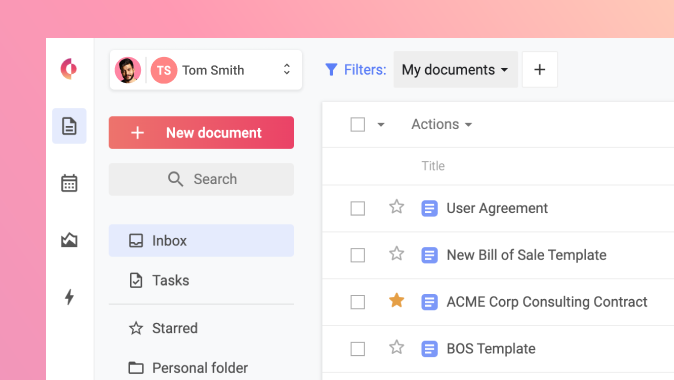6 Ways Contract Mismanagement Can Sink a Business
This article originally appeared on ITProPortal.
The moment a contract leaves the digital ecosystem, risk and added cost are introduced into the equation. Let’s examine some of the unintended consequences of manual contract management.
Contracts are the cornerstone of business. These agreements are essential for organizations to thrive, and their execution is essential to unite disparate parties in pursuit of common goals. Despite their critical role in shaping operational success, contracts are often the final hardcopy holdout in an increasingly digital workplace.
Even contracts that originate as digital documents are often printed, whether to make redline changes or add final signatures. But the moment a contract leaves the digital ecosystem, risk, and added cost are introduced into the equation. Let’s examine some of the unintended consequences of manual contract management.
Missed opportunities
Without a platform in place that provides insight into deadlines, renewals, and all the information necessary to properly manage contracts, it’s difficult to track every date and stay on top of timelines. Being unable to manage these things means a company is able to take on fewer contracts, ultimately leading to less revenue and limiting the potential for future growth. If the contracts that an organization already has aren’t able to be managed well, adding more contracts only complicates things.
Inability to expand is not a promising trajectory for a business. Instead, finding a solution that allows contract managers to have a full picture of every document, including deadline alerts and powerful search, eliminates the chaos and helps contracts be well organized.
Failure to enforce
When there’s no clear insights into contracts, enforcing terms is not as simple. Terms that go unfulfilled reduce the benefits of an agreement and make it more expensive in the end if the goods are not delivered as promised. The ability to monitor compliance well decreases the chances that another party won’t comply, ensuring the agreement is carried out by both sides.
A contract lifecycle management platform should have a comprehensive audit trail that clearly outlines how and when the agreement was made. Pre-approved templates can also assist in this circumstance as the legal team is able to define terms.
Time lost
From an individual standpoint, it’s not only frustrating to search through filing cabinets or emails for documents, but it wastes company time and talent. With this tedious work eliminated, employees are freed up to focus on more strategic work that directly impacts a company’s growth, revenue, and scalability.
A contract management platform consolidates all people, processes, and documents into one place, taking away the need to spend valuable time tracking down these things. With templates, approval workflows, and access control for everyone that needs it, a platform should drastically cut down the time spent managing contracts and be able to focus that time on more productive tasks, such as procurement, enforcement, fulfilling, and many other things.
Errors and additional work
Without a cloud-based automated platform to streamline processes, it’s difficult to find errors, much less correct them. Rogue contracting is a common practice in organizations that don’t have clear practices outlined, or a single source of truth for all documents. Even if employees are using a template, often it’s an outdated version that was saved directly to their desktop and never updated. Working this way means that the legal team is often not looped in, and if they are, much of the approval process is spent updating clauses and terms that were already created in another template.
All of these issues can be ameliorated simply by moving to a full lifecycle management platform. With templates in place that are automatically updated, there’s no risk of using an old clause that could set the company up for risk. Simply the knowledge that there’s a platform in place will help employees remember that they need to create a contract and use it.
Security
Manually creating contracts puts a company at risk, especially after the contract is signed. Storage is a key part of the contract lifecycle, and any solution that doesn’t have bank-level security might not be enough to protect sensitive documents.
In addition to storage, there are certain eyes that should see a contract and others that should not, even within an organization. If documents are stored in a file cabinet or even on a shared drive, there’s a risk of security being breached without the proper viewing rights. A successful platform should have access controls that give people access only to the documents they need—making the documents not only more secure, but the platform cleaner and easier for users as they only see what’s directly relevant to them.
Legality
Since a contract is a legally binding document, any mishaps could cause serious implications for a company. That means ensuring everything from the way documents are stored to the way they are signed is essential for mitigating unnecessary risk. Having the right amount of visibility to manage things such as renewals and timing is critical for risk-free contracts.
The good news is, with a contract lifecycle management platform, the legal team has full insight into every single contract within a company. IT teams are able to verify the security of a platform and set up the right controls, whether it’s single sign-on or access controls. E-signatures are binding legal agreements that are recognized in the U.S., E.U., and most other countries, ensuring every document signed within the platform is fully legal.
With the above concerns taken into account and addressed, any organization’s contracts should be much safer. As digitization becomes essential to keeping up with the pace of business, it’s critical to make sure that risks are kept low to ensure success and the ability to scale with confidence.



